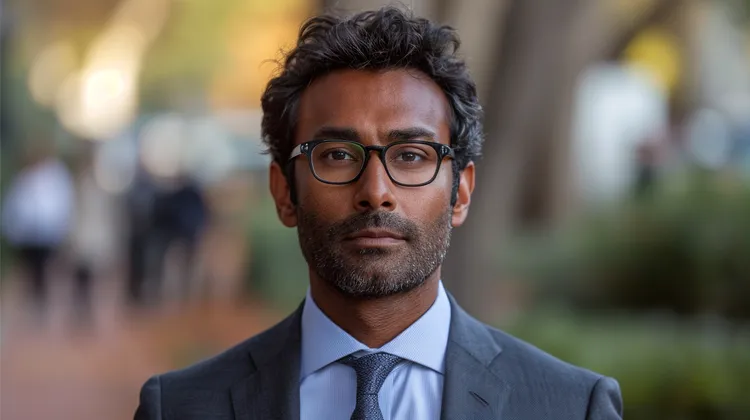
Crypto Advocate Ramaswamy Halts Presidential Bid
Vivek Ramaswamy, a prominent entrepreneur and Republican hopeful known for his pro-cryptocurrency stance, has officially announced the suspension of his bid for the U.S. presidency. Despite a campaign that gained notable support from the tech and finance communities, Ramaswamy’s journey to the White House has reached an abrupt halt.
Ramaswamy, whose rise to prominence came as a result of his successful ventures in biotech and his later outspokenness about anti-Woke culture, entered the political arena as a fresh face with a different kind of agenda—one that heavily favored the integration of blockchain technology and cryptocurrencies into the national economy. His vision was to position the U.S. as a global leader in crypto innovation.
In the early stages of his campaign, Ramaswamy showcased an in-depth understanding of digital currencies and their underlying technologies. His proposals included creating a regulatory environment that fostered innovation, balancing consumer protection with market freedom, and exploring a U.S. central bank digital currency (CBDC). This platform made him notably attractive to a demographic of young, tech-savvy voters, especially at a time when distrust in traditional financial institutions was growing and interest in cryptocurrencies was at an all-time high.
Ramaswamy’s agenda also touched upon the need for clear and consistent legislation that would eliminate the ambiguity surrounding cryptocurrencies. He criticized the opaque regulatory practices that, in his opinion, stifled the growth of the industry. His solution was a streamlined regulatory process that would enable clear communication and compliance paths for crypto-related businesses and services.
Despite the initial excitement around his crypto-friendly policies, Ramaswamy struggled to gain traction among the broader electorate. This was partly due to the deeply polarized political climate in the U.S., where issues such as healthcare, immigration, and economic policy remained at the forefront of voters’ minds. While the promise of a progressive stance on cryptocurrencies appealed to a niche group of voters, it was not sufficient to galvanize a nationwide campaign.
The cryptocurrency market faced significant volatility during Ramaswamy’s campaign. High-profile hacks, scams, and the overarching bear market cast a shadow on the industry, making it a less appealing talking point for the candidate. These developments contributed to a growing skepticism about the stability and viability of cryptocurrencies as a cornerstone of economic policy.
Internal campaign challenges also played a role in the decision to suspend his presidential bid. Fundraising difficulties and the changing landscape of campaign financing, where more established candidates boasted larger war chests, presented significant obstacles. As a relative newcomer to the political scene, Ramaswamy lacked the extensive political network that often fuels successful campaigns.
The crypto-friendly candidate encountered a competitive field of Republican contenders, many of whom had greater political experience and name recognition. With the primary season approaching and poll numbers not reflecting a viable path to the nomination, Ramaswamy and his campaign team were faced with tough strategic decisions.
In a statement announcing the suspension of his campaign, Ramaswamy expressed gratitude to his supporters and underscored his continued commitment to promoting his ideals outside of the presidential race. He emphasized that his vision for an American revival, powered in part by technological innovation in the financial sector, was far from over.
He also hinted that his future endeavors might include continued advocacy for cryptocurrency and blockchain technology. By leaning on his background as a successful entrepreneur, Ramaswamy could position himself as a key influencer in the ongoing debate over America’s digital economy.
The news of Ramaswamy’s campaign suspension sent ripples through the cryptocurrency community, many of whom had pinned their hopes on having a strong voice for crypto in the political arena. While some expressed disappointment, others looked to the broader impact that his campaign had made in bringing the conversation about crypto to national politics.
In the aftermath of Ramaswamy’s withdrawal, it remains to be seen how other candidates will address the growing interest in cryptocurrency regulation and innovation. Some may adopt parts of Ramaswamy’s platform to capture the attention of the tech electorate, while others may continue to focus on more traditional campaign issues.
As the 2024 U.S. presidential election continues to take shape, the suspension of Vivek Ramaswamy’s campaign stands as a reminder of the challenges facing outsider candidates and the evolving role of technology in American political discourse. Despite the end of his presidential run, Ramaswamy’s ideas are likely to leave an enduring impression on the nation’s crypto policy landscape for years to come.
4 thoughts on “Crypto Advocate Ramaswamy Halts Presidential Bid”
Leave a Reply
You must be logged in to post a comment.
I doubt other candidates will bother picking up his crypto torch. It’s a non-issue for most voters.
Vivek Ramaswamy’s pro-crypto policies energized many. Can’t wait to see what he does next!
Dream all you want about a crypto-future, but that doesn’t address today’s problems!
Ramaswamy’s ideas were too niche. We need someone who can appeal to the masses.